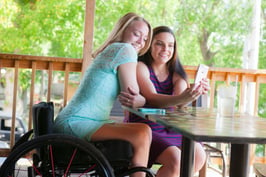Girls with Disabilities Desperately Need Disabled Wome - Reeve Foundation
By guest blogger Stephanie Woodward
Women are 50.8% of the population in the United States and one in four women in our nation is disabled. While there are some studies and statistics that track the prevalence of women in leadership positions nationally and globally, studies or statistics that track the prevalence of women with disabilities in leadership positions are difficult to find, if not nonexistent.
I have been searching for studies, articles, research – anything at all – that demonstrates the prevalence of women with disabilities in leadership in America, and I have yet to find anything of substance. The research that I have found on women and girls with disabilities is not related to leadership, but it is important for us as a country to reflect on:
- Women with disabilities experience higher unemployment rates than women without disabilities and men with disabilities.
- Approximately 1 in 5 people with a disability have less than a high school diploma, compared with 1 in 10 people with no disability.
- Women with disabilities have significantly lower self-cognition and self-esteem, and greater social isolation than women without disabilities.
- Girls and women with disabilities have significantly less education, more overprotection during childhood, poorer quality of intimate relationships than those without disabilities.
- Disabled girls often do not have disabled adult role models to be positive influences in their lives.
- Girls with disabilities have a greater need for disabled adult role models because there is less visibility of successful disabled women in our culture, there are more limited “socially sanctioned roles” for women with disabilities in our communities.
These facts demonstrate that girls with disabilities in the United States could greatly benefit from the mentorship of successful disabled women.
Why mentoring? Because mentoring works.
Youth with mentors experience increased self-esteem and confidence
Girls with disabilities have lower self-cognition and self-esteem than their nondisabled peers. This is, in part, because girls and women with disabilities perpetually face assaults on their self-esteem by stereotypes that disabled women are incompetent, asexual, and incapable. This is compounded by the fact that there is less visibility of successful disabled women, so girls with disabilities do not have positive disabled role models to help counter these negative stereotypes. However, we know that youth who have mentors experience increased self-esteem and confidence. Increasing the self-esteem and confidence of girls with disabilities by pairing them with successful disabled women mentors is key because their shared experiences of disability and womanhood allow the mentor to demonstrate to the mentee what disabled women and girls truly can achieve.
Students with mentors are more likely to graduate high school
Mentoring has a significant impact on the education of young adults. Young adults with mentors are 52% less likely than their peers to skip a day of school and 37% less likely to skip a class. This is critical because absenteeism is an early warning indicator of falling off track for graduation. This is especially important for students with disabilities because disabled students are among those who are most frequently absent from school. Identifying why a disabled girl is absent from school or skipping a class and addressing that issue may be easier if she has a disabled woman mentor to talk to. For example, if she skips a class because the materials are inaccessible to her, she can discuss this with her mentor, who may have gone through the same experiences, or if her absenteeism is because she concerned about performing her bladder and bowel programs at school, she will likely feel more comfortable talking about that with a mentor who has navigated that experience before.
Women with disabilities who graduate from high school are more likely to gain employment
Education levels impact a person’s chances of employment – this is true for all people, disability or not. However, data demonstrates that this is especially true for women with disabilities in the United States. Less than one-fifth of disabled women without a high school diploma are employed, but that number jumps to more than 30% for disabled women with a high school diploma. If a woman with a disability has a college degree or higher, her employment rate increases to above 50%.
By having a disabled woman mentor to help a young woman with a disability through high school, that young woman will automatically have increased employment probabilities. Additionally, by giving visibility to what disabled women can do, employed mentors can help their mentee see their own potential.
Young adults who have a mentor are more likely to become leaders
Young women with disabilities can and should become leaders. We can and should change the status quo from not being able to find any research about disabled women as leaders to helping to foster the growth of disabled women leaders. This is possible because young adults who have a mentor are 130% more likely to hold leadership positions. By focusing our efforts on ensuring that girls with disabilities can be matched with successful disabled women mentors, we can increase their chances of becoming leaders.
Stephanie Woodward is an attorney and co-founder of Disability EmpowHer Network. Stephanie is passionate about seeking justice for marginalized communities - and has an arrest record to show for it. As a proud disabled woman and civil rights activist, Stephanie is committed to bringing more women and girls with disabilities to the forefront through mentoring and activism.
Join Our Movement
What started as an idea has become a national movement. With your support, we can influence policy and inspire lasting change.
Become an Advocate